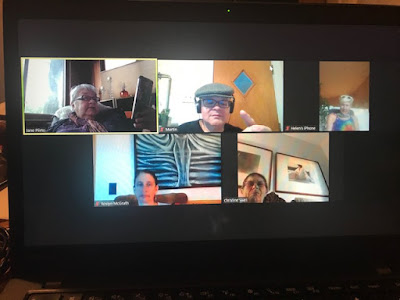It is past midnight as I type this post. It is literally Sunday, and yet my mind is still in the busyness of Saturday, with its church cleaning, Zoom meeting, house straightening, toilet scrubbing, organ playing, Mass attending, and book club preparing. I'm sure I've left some things out.
That is the way most of my weekends go. On Friday night, it seems as though the weekend is some beautiful blank page rolled into a typewriter, waiting for words. (For those of my disciples who are younger: a typewriter was the 20th equivalent of a laptop or MacBook. It's what we wrote our school papers on, but without Spell Check or Autocorrect.) When I go to bed on Friday night, I feel like a person of leisure. And now, a mere 24 hours later, I feel as though Saturday has galloped by and Sunday is breathing down my neck.
At the beginning of the pandemic, time seemed to grind to a halt, and the world felt as if it was stuck in the longest traffic jam in the universe. Days didn't go by in minute increments. They tortoised. Snailed. Slothed. Friday morphed into Monday into Thursday afternoon. March became Marchaprilmay.
As the state of Michigan reopens now, I feel like I've just made the jump to hyperspace. Suddenly time, which had been in a perpetual state of frozen, is now doing the Kessel Run in less than twelve parsecs. (That will make sense to any Star Wars geek.) And I'm not sure that's a good thing. However, that's the reality at the moment.
The other reality is that for the fifth day in a row, the United States has surpassed the single-day record of new novel coronavirus cases: 44,782 new infections today. At the moment, the death rate isn't climbing drastically. That will probably start occurring in about two weeks, if the past is any indication
Anthony Faucci, the top infectious disease doctor in the country, went on TV yesterday and pleaded with people to maintain social distancing, stay at home, avoid large gatherings, and wear masks. He couldn't have been simpler and clearer. And yet, in my neck of the woods, the Upper Peninsula, people seem to believe we aren't part of the United States. That Florida and Texas are planets light years away. Two months ago, masks were present everywhere in the U. P., wherever you went. Last night, I watched people walking into a high school graduation ceremony, nary a mask in sight.
I'm not writing this post to generate controversy or argument. Some people I work with in the medical field have somehow made this whole pandemic a battle about whether wearing masks is necessary and effective in slowing the spread of Covid-19. I don't understand this argument. You don't walk into an operating room without a mask on, because you don't want to cause infection. So, why wouldn't you believe in the efficacy of mask-wearing to slow down the spread of this virus?
Anyway, the United States continues to be one of the few countries where Covid-19 numbers are increasing exponentially. Other countries are now considering banning citizens of the United States from travelling. That's right folks--remember when Donald Trump instituted a travel ban on China? Well, the same thing's going to happen to us. Cancel those vacation plans. Covid-19 hasn't vanished like a miracle. If anything, the beginning of summer has accelerated its spread.
So, keep your distance. Wear your mask. Be the miracle.
And if you do that, Saint Marty will give thanks.
. . . and a poem, just in case you're thinking about not wearing your mask:
Poem from Kyrie
by: Ellen Bryant Voigt
With no more coffins left, why not one wagon
plying all the shuttered neighborhoods,
calling for the dead, as they once did,
and let the living rest of us alone.
My father's pair of horses made the turn
at the big elm, onto the main road,
and we saw, strung out before us in the mud,
consecutive up the hill, links in a chain,
a caravan. Ahead of us in line:
three wrapped loaves. So I stared at the horse's head
between our mare's black ears, its brown ears framed
a gray, the gray a mule, until in the lead,
at the crest, was a child's toy, and a toy sled,
what lay in back shrunk to a cotterpin.

















